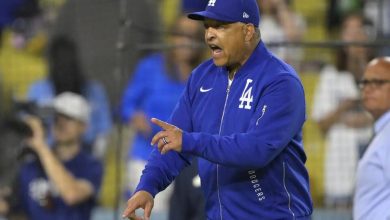Texas Longhorns aren’t worried about Arch Manning’s potential struggles, having supported him during his development while watching Quinn Ewers lead the team over the past two seasons.

The Texas Longhorns’ football program stands at a pivotal juncture as they prepare for the upcoming season, with high expectations and a roster brimming with talent. Central to their future plans is quarterback Arch Manning, a highly touted recruit and the grandson of NFL Hall of Famer Archie Manning. While many fans and analysts are eager to see Manning take the field as the Longhorns’ starting quarterback, the coaching staff, led by head coach Steve Sarkisian, remains calm and confident about his development trajectory—even if setbacks or struggles arise early on.
A Background of Patience and Development
For the past two seasons, Manning has been in a unique developmental phase, observing and learning from established quarterback Quinn Ewers. During this period, Manning has been under Ewers’ mentorship, absorbing the nuances of Sarkisian’s offensive system, studying film, and sharpening his skills in practice settings. This mentorship period has been crucial, especially given Manning’s status as one of the most highly rated quarterback prospects in recent memory.
The Longhorns’ approach reflects a broader philosophy of patience and long-term development. They recognize that transitioning from a highly rated recruit to a college starting quarterback involves more than just talent; it requires mental maturity, understanding of complex offensive schemes, resilience, and the ability to handle pressure. The coaching staff’s strategy has been to give Manning the time and environment to grow without rushing his progression, understanding that early struggles are part of the process for many young quarterbacks.
Support and Confidence from the Coaching Staff
Steve Sarkisian, who has a reputation for developing quarterbacks and creating dynamic offensive schemes, has publicly expressed confidence in Manning’s potential. Sarkisian emphasizes that Manning’s journey is still in its early stages and that the coaching staff is committed to nurturing his talent. The head coach has pointed out that early struggles are common and not necessarily indicative of future success or failure.
In interviews, Sarkisian has highlighted Manning’s work ethic, intelligence, and leadership qualities, which are vital traits for a quarterback’s growth. The staff’s confidence stems not just from Manning’s raw talent but also from his ability to learn, adapt, and improve over time. The Longhorns’ approach aligns with the belief that patience and proper development are essential, and they are prepared to support Manning through inevitable ups and downs.
Why the Longhorns Are Not Concerned About a ‘Bust’ Season
The concern about a quarterback “bust”—a highly touted recruit who fails to meet expectations—is a common narrative in college football. However, the Longhorns’ perspective on Manning is rooted in their understanding of his background, work ethic, and the support system surrounding him. They recognize that setbacks are part of growth, especially for a player adjusting to the rigors of college football.
Moreover, the Longhorns’ confidence is bolstered by their broader team strength and the stability of their program. They have a talented roster, experienced offensive linemen, and a coaching staff with a proven track record of developing quarterbacks. This environment provides a safety net for Manning, allowing him to learn and grow without the immediate pressure of carrying the team.
The program’s patience reflects a longer-term vision. Rather than rushing Manning into a starting role prematurely, they prefer to see him develop at his own pace, ensuring that when he does step into the spotlight, he is ready to perform at a high level. This approach minimizes the risk of a “bust” season and maximizes his potential for sustained success.
The Learning Curve and Handling Expectations
Manning’s journey is also about managing expectations. Coming into college with a high profile can create immense pressure, and some may worry that early struggles could lead to doubts about his long-term prospects. However, the Longhorns’ staff has been proactive in framing Manning’s development as a process, emphasizing that setbacks are normal and part of becoming an elite quarterback.
They point out that many successful NFL quarterbacks faced adversity in their early years—learning the game, adjusting to the speed of college football, and handling media scrutiny. Manning’s support system includes experienced coaches, mentors, and teammates who understand the importance of patience and resilience.
Furthermore, the Longhorns’ culture promotes mental toughness and continuous improvement. The coaching staff believes that Manning’s ability to handle adversity, learn from mistakes, and maintain confidence will ultimately define his success or failure.
Past Examples and Lessons Learned
Texas’s approach is informed by lessons learned from previous recruitings and quarterback development stories. They understand that not every highly rated prospect will immediately shine, and some may need time to fully realize their potential. The coaching staff has historically prioritized player development over instant results, which has often resulted in successful careers for their quarterbacks.
This perspective reassures fans and critics alike that the Longhorns are not overly concerned about a potential “bust” season involving Manning. Instead, they see his early struggles as part of a natural development process, with the ultimate goal of producing a confident, capable leader under center.
The Bigger Picture: Building a Long-Term Winner
Texas’s confidence in Manning is also tied to their broader vision of building a sustained winning program. They recognize that the quarterback position is vital but also that success depends on a well-rounded team effort. The coaching staff is focused on developing all aspects of the team—defense, special teams, offense—so that Manning can operate within a balanced, cohesive system.
This holistic approach mitigates the pressure on Manning and allows him to learn and perform without the burden of immediate expectations. It also fosters a culture of patience and resilience, which is essential in college football’s competitive environment.
Trusting the Process
In summary, the Texas Longhorns’ stance on Arch Manning’s potential “bust” season is one of unwavering support and patience. They have invested in his development, watched him learn from Quinn Ewers and other veteran players, and believe in his long-term potential. The coaching staff understands that setbacks are inevitable but views them as opportunities for growth rather than indicators of failure.
Their confidence is rooted in Manning’s work ethic, leadership qualities, and the supportive environment they’ve cultivated. They’re committed to allowing him the time to develop into the quarterback they envision—one capable of leading Texas to new heights. For the Longhorns, Manning’s early struggles are just part of the journey, and they are prepared to stand by him as he matures into a confident, effective leader on the field.









